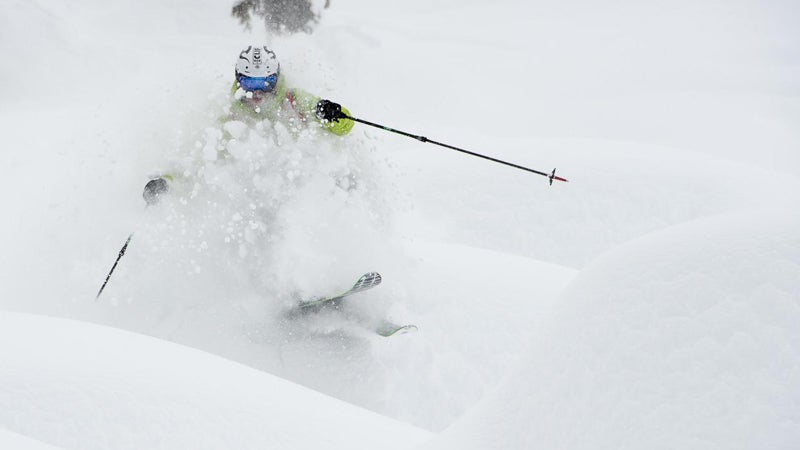Last year, ŌĆ£sidecountryŌĆØŌĆöa term used to describe lift-accessed backcountry terrainŌĆöwas the outdoor industryŌĆÖs hot new buzzword. And the hype bled into the media, too. Search for the word on this website, and youŌĆÖll get 207 results from 2013. ┬Ā┬Ā
This year, the term has all but disappeared from manufacturersŌĆÖ vocabularies. ThatŌĆÖs not to say skiers and riders donŌĆÖt still use it, or that it doesnŌĆÖt belong in snow-sports vernacular. It .
But when it comes to marketing, last yearŌĆÖs most referenced industry buzzword is dead. Which is a good thing.┬Ā
Just last month, Tony SiebertŌĆöthe grandson of Vail founder Pete SiebertŌĆödied in an avalanche while skiing the East Vail Chutes, a popular destination accessible via a short hike from one of VailŌĆÖs T-bars. The route could technically be defined as sidecountry, but the term doesnŌĆÖt make the Chutes any less deadly, and it masks the risks involved. ┬Ā ┬Ā┬Ā
The trail to find exactly where the buzzword died is a circuitous one, but thereŌĆÖs a black-and-white motive behind its demise. Backcountry skiing is binaryŌĆöyou are either in or out of bounds. When it comes to safety, thereŌĆÖs no gray area.
The term has pretty innocuous beginnings. ŌĆ£ŌĆśSidecountryŌĆÖ became the word that we as an industry started in order to typify something that was sexier than in-bounds skiing,ŌĆØ says Scarpa CEO Kim Miller. ŌĆ£We wanted to give people the feeling there is more adventure out thereŌĆöespecially through the access of a resort.ŌĆØ
According to Miller, companies never meant to imply that sidecountry was less dangerous than the backcountry. They thought it was clear that once you slipped past a resort area boundary, you were in the backcountryŌĆöand out of the resortŌĆÖs safety net.
There arenŌĆÖt typically large physical barriers between in-bounds and out-of-bounds runsŌĆöall youŌĆÖll usually see is a gate, a rope, or a signŌĆöso companies began to worry that the term would confuse first-time backcountry skiers. Novices might wonder if they needed true backcountry equipment if they were only skiing the sidecountry. (The answer, in case youŌĆÖre wondering, is a resounding yes.) ┬Ā┬Ā
ŌĆ£One of the issues was the mixed messages that sidecountry sends,ŌĆØ says Backcountry Access founder Bruce Edgerly. ŌĆ£ItŌĆÖs a great term to describe equipment and uses,ŌĆØ he continues, ŌĆ£but it can imply that skiing near a resort is safer. We have seen itŌĆÖs not.ŌĆØ
Though the retirement of sidecountry likely started last winter with a backcountry task force, it was the National Ski Areas Association (NSAA) that most actively lobbied for its obsolescence. ┬Ā┬Ā
ŌĆ£While it is clearly the responsibility of individuals to do their homework and make their own decisions, we all must focus on educating skiers and snowboarders that backcountry terrain accessed from a ski lift has the same risks as any other backcountry or out-of-bounds area,ŌĆØ wrote Dave Byrd, NSAAŌĆÖs director of Risk and Regulatory Affairs, in the organizationŌĆÖs January journal. ┬Ā┬Ā
The problem with the term ŌĆ£sidecountryŌĆØ lies in how it can falsely characterize the riskiness of terrain, Byrd says. But while the NSAA strongly opposed the word, it couldnŌĆÖt very well police the industryŌĆÖs marketing copy. Instead, the outdoor industry decided to police itself.
With more people dying every year in lift-accessed backcountry terrain, manufacturers have become much more aware of the words theyŌĆÖve been using. ŌĆ£Skiing has reinvented itself so many times, depending on what people want, and we have to carry a different kind of ethos and mentality into that,ŌĆØ Miller says. ŌĆ£We have to be really thoughtful when we deal with things that are risky. I have dug a lot of people out from under avalanche slides, and have been dug out myself. I donŌĆÖt want any more of that than we have already seen.ŌĆØ┬Ā


